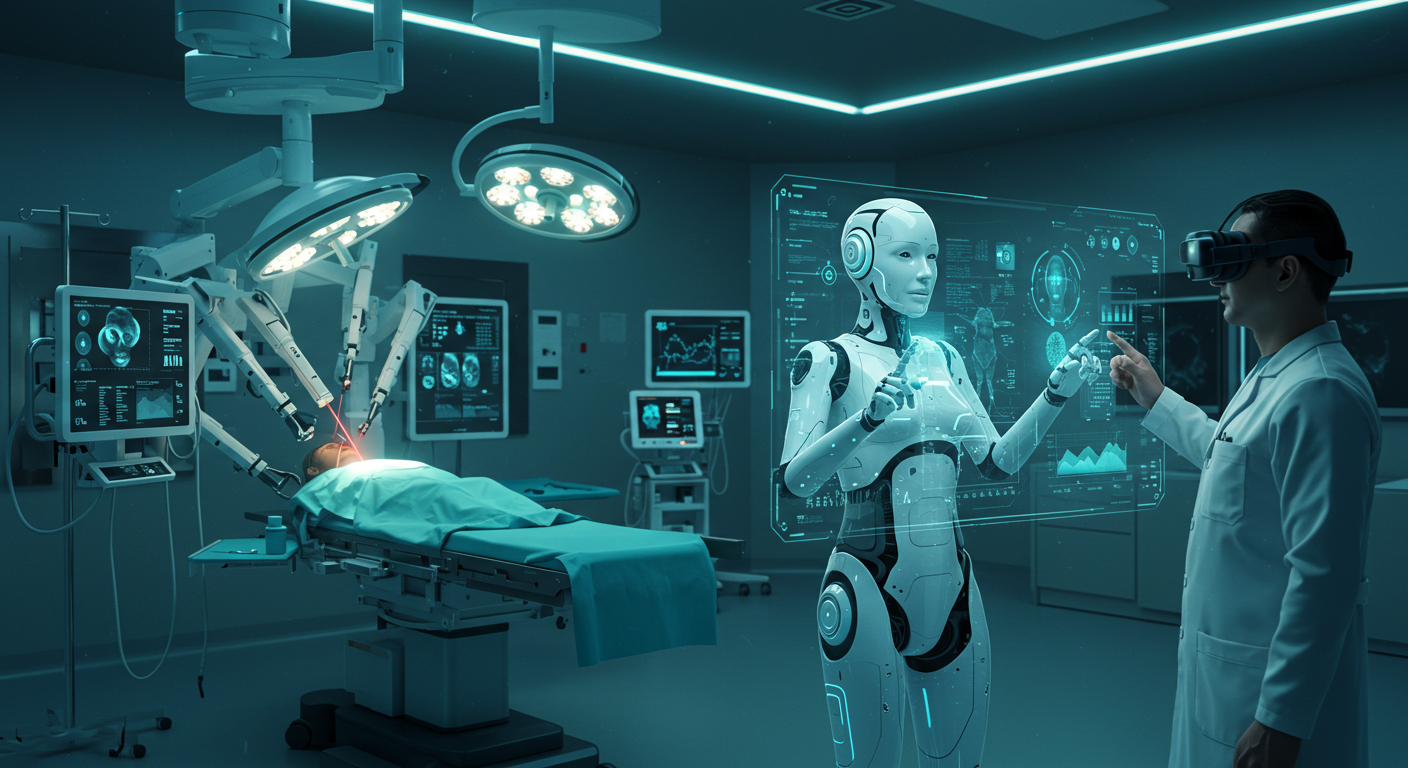Table of Contents
1. Introduction: The Future of AI in Healthcare
Artificial Intelligence (AI) is rapidly reshaping the healthcare industry, making diagnoses faster, treatments more effective, and administrative tasks more efficient. In 2025 and beyond, AI’s integration in healthcare is not just a trend—it is a revolution.
The future of AI in healthcare promises groundbreaking advancements, from AI-powered diagnostics to robotic-assisted surgeries and personalized medicine. This article explores how AI is revolutionizing patient care, medical research, and operational efficiency in hospitals and clinics worldwide.
By the end of this post, you will understand: ✅ How AI improves medical diagnostics and treatments ✅ How AI-powered robots assist in surgeries and drug discoveries ✅ The challenges and ethical considerations surrounding AI in healthcare
2. AI-Powered Diagnostics: Speed & Accuracy
One of the most promising applications of AI in healthcare is its ability to analyze medical data and detect diseases with high accuracy. Traditional diagnostic methods often rely on human expertise, which, while invaluable, can sometimes lead to errors or delays. AI eliminates these barriers by:
🔹 Enhancing radiology scans – AI can analyze X-rays, MRIs, and CT scans faster than human radiologists. 🔹 Detecting diseases early – AI models, like Google’s DeepMind, have shown over 90% accuracy in detecting breast cancer. 🔹 Predicting patient risks – AI can assess medical histories and predict the likelihood of chronic diseases like diabetes or heart conditions.
Case Study: AI Diagnosing Cancer Faster Than Doctors
A study published in Nature revealed that AI-powered algorithms outperformed experienced radiologists in detecting breast cancer from mammograms, reducing false positives by 5.7% and false negatives by 9.4%.
3. AI in Personalized Treatment Plans
AI is paving the way for personalized medicine, tailoring treatments to individual patients based on genetic data, lifestyle, and medical history. With AI, doctors can:
🔹 Predict how a patient will respond to a drug before administering it. 🔹 Optimize treatment plans based on real-time patient data. 🔹 Reduce medication side effects by prescribing the most effective and least harmful options.
Example: IBM Watson in Oncology
IBM Watson for Oncology uses AI to analyze millions of medical papers and suggest the most suitable treatment for cancer patients, considering their specific medical conditions.
4. AI and Robotics in Surgery
AI-powered robotic systems are enhancing precision, reducing human error, and enabling minimally invasive procedures. Robotic-assisted surgeries, powered by AI, improve outcomes in procedures like:
🔹 Neurosurgery – AI-powered robots assist in delicate procedures, reducing damage to healthy tissues. 🔹 Orthopedic surgery – AI enhances joint replacements by improving implant positioning. 🔹 Laparoscopic surgery – AI-powered tools provide real-time guidance for minimally invasive procedures.
Example: Da Vinci Surgical Robot
The Da Vinci system, an AI-powered robotic surgical assistant, allows surgeons to perform complex operations with precision, leading to faster recovery times and reduced complications.
5. AI for Administrative Efficiency in Healthcare
Hospitals and clinics often struggle with administrative inefficiencies, leading to delays in patient care and increased costs. AI can streamline these processes by:
🔹 Automating patient scheduling and billing 🔹 Enhancing medical record management with NLP (Natural Language Processing) 🔹 Reducing wait times with AI-powered chatbots handling appointment bookings and inquiries
Example: AI Chatbots in Telemedicine
AI chatbots like Babylon Health assist patients by analyzing symptoms and guiding them to the appropriate care, reducing the burden on healthcare providers.
6. AI’s Role in Drug Discovery and Development
Developing new medications is time-consuming and expensive. AI accelerates this process by:
🔹 Analyzing massive datasets to identify potential drug candidates 🔹 Predicting drug interactions and side effects 🔹 Optimizing clinical trials by selecting the most suitable participants
Example: AI in COVID-19 Vaccine Development
During the COVID-19 pandemic, AI helped analyze molecular structures to identify potential vaccine candidates, significantly speeding up the research process.
7. Ethical Considerations & Challenges
Despite its benefits, the future of AI in healthcare comes with challenges:
🔹 Patient privacy concerns – AI requires vast amounts of medical data, raising security issues. 🔹 Bias in AI algorithms – AI systems can be biased if trained on non-diverse datasets. 🔹 Regulatory hurdles – Government policies need to evolve to integrate AI safely in healthcare.
Healthcare organizations must address these challenges through transparent AI policies, strict data security measures, and continuous model training.
8. Future Predictions: AI’s Long-Term Impact on Healthcare
🔮 By 2030, AI is expected to: ✅ Reduce medical errors by 50% ✅ Improve patient recovery rates by 40% ✅ Lower healthcare costs through automation & efficiency ✅ Enable AI-driven virtual hospitals with remote monitoring
9. Conclusion: The AI-Powered Healthcare Revolution
The future of AI in healthcare is not just promising—it’s transformative. From diagnosing diseases with precision to enabling robotic-assisted surgeries and optimizing treatment plans, AI is setting a new standard in modern medicine.
📌 What’s Next? 💬 Do you think AI will replace human doctors, or will it serve as a powerful assistant? Share your thoughts in the comments!
🚀 Stay ahead of tech trends—subscribe to Encyclotech for more AI insights!

